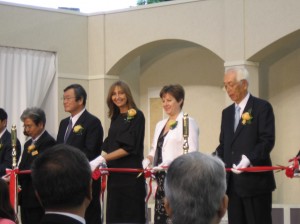 Japan has just passed a significant milestone: the average household now spends more on bread than it does on rice. I'm not sure why, as most of the bread on sale here has the taste and texture of cotton wool (I'm imagining the taste bit). Which is why a colleague at the Embassy has started a bit of a craze for home bread-baking. He gave me a sourdough starter this week, now fermenting away nicely in my kitchen, and I'm looking forward to baking my first loaf tomorrow.
Japan has just passed a significant milestone: the average household now spends more on bread than it does on rice. I'm not sure why, as most of the bread on sale here has the taste and texture of cotton wool (I'm imagining the taste bit). Which is why a colleague at the Embassy has started a bit of a craze for home bread-baking. He gave me a sourdough starter this week, now fermenting away nicely in my kitchen, and I'm looking forward to baking my first loaf tomorrow.
I'm convinced this is the bread for me: the River Cottage recipe tells you not to be impatient, because this particular dough "rises slowly and sedately" - which I do too these days, my knees having apparently aged faster than the rest of me. I think I may have found the answer though: Honda are using the technology used for their loveable humanoid robot, Asimo, to develop gadgets to support older factory workers, enabling them to stand or crouch for long periods on the assembly line. Wonder if there are plans for a household version?
Aging is all the rage in Japan, with the birth rate hovering around 1.4 children per woman and the over-65s now accounting for over 20% of the population. In economic terms this age group is more significant still: they account for about JPY 70 trillion worth of consumer spending - 31% of the total. Not surprisingly, companies are rushing to develop products and services that cater to the needs of these affluent and often very active baby-boomers. Some department stores have whole cosmetics counters devoted to the mature shopper, with an array of potions for concealing liver spots and reducing wrinkles.
The leisure industry offers special deals for retirees travelling with their partners and/or dogs - this generation is one of animal-lovers - and concerts for grandparents to introduce their grandchildren to classical music. As in the UK, grandparents take on a fair amount of childcare duties, and children's products are often targetted at doting grandparents.
The "active silver" generation was much in evidence at the opening last week of Japan's answer to the Chelsea Flower Show - held, somewhat incongruously, in a baseball stadium. Next to me in the line-up for the official tapecut was Cath Kidston, hugely popular here, whose house and garden in the Cotswolds had been recreated by designer Mark Chapman, somewhere around first base. Complete with "smoke" drifting out of the chimney and washing on the line, it was the hit of the show, especially with Cath there herself to show visitors around her herb garden and share her dahlia-growing secrets. A great foil for demonstrating British landscape design, gardening products and floral-themed gifts and household goods, and of course David Austin roses, whose staff told me that Japan is their second most profitable market after the UK.
As the population ages further, and the number of single-person households increases, needs of course begin to change. Other innovations that I've seen advertised recently include devices that keep an eye on lone householders - water dispensers that alert a monitoring centre if not activated for a certain period, or a pendant that dials a phone number if it detects that the wearer has fallen (it can apparently distinguish between that and just being dropped). All this is giving Japanese companies an important market lead as the rest of the world follows in its aging footsteps - Japanese businesses are offering housekeeping services in China, as well as wheelchair-friendly vehicles, nursing goods and healthy foodstuffs. Worldwide, the over-60s population is projected to rise to 2 billion in 2050, from 800million now. By 2020 their combined consumption is expected to reach $15tn - roughly equivalent to US GDP. So a massive market that eclipses all the other fast-growing markets that vie for business attention. If you hope to gain a share of it you would do well to start in Japan - let us know if we can help you.
And one final factoid: sales of adult nappies have now overtaken sales of baby nappies in Japan. Now there's a sobering thought.
Sue Kinoshita
Director, UKTI Japan
